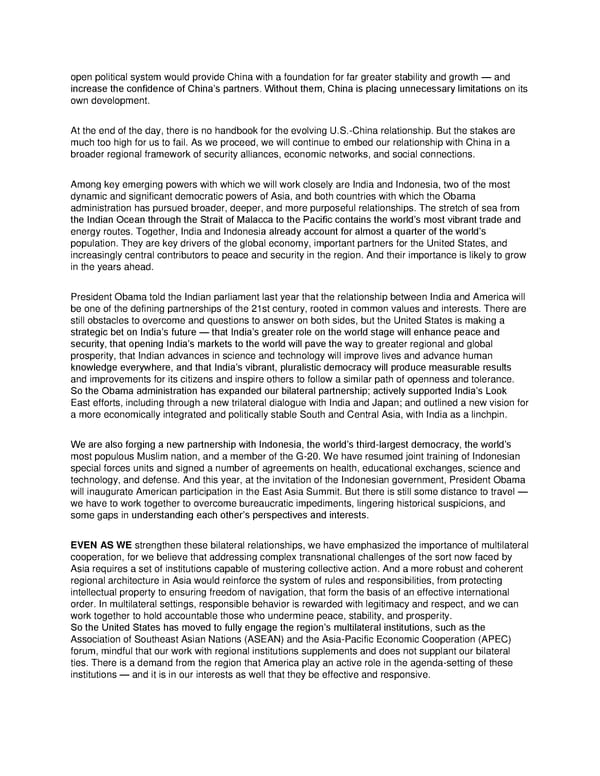open political system would provide China with a foundation for far greater stability and growth — and increase the confidence of China’s partners. Without them, China is placing unnecessary limitations on its own development. At the end of the day, there is no handbook for the evolving U.S.-China relationship. But the stakes are much too high for us to fail. As we proceed, we will continue to embed our relationship with China in a broader regional framework of security alliances, economic networks, and social connections. Among key emerging powers with which we will work closely are India and Indonesia, two of the most dynamic and significant democratic powers of Asia, and both countries with which the Obama administration has pursued broader, deeper, and more purposeful relationships. The stretch of sea from the Indian Ocean through the Strait of Malacca to the Pacific contains the world’s most vibrant trade and energy routes. Together, India and Indonesia already account for almost a quarter of the world’s population. They are key drivers of the global economy, important partners for the United States, and increasingly central contributors to peace and security in the region. And their importance is likely to grow in the years ahead. President Obama told the Indian parliament last year that the relationship between India and America will be one of the defining partnerships of the 21st century, rooted in common values and interests. There are still obstacles to overcome and questions to answer on both sides, but the United States is making a strategic bet on India’s future — that India’s greater role on the world stage will enhance peace and security, that opening India’s markets to the world will pave the way to greater regional and global prosperity, that Indian advances in science and technology will improve lives and advance human knowledge everywhere, and that India’s vibrant, pluralistic democracy will produce measurable results and improvements for its citizens and inspire others to follow a similar path of openness and tolerance. So the Obama administration has expanded our bilateral partnership; actively supported India’s Look East efforts, including through a new trilateral dialogue with India and Japan; and outlined a new vision for a more economically integrated and politically stable South and Central Asia, with India as a linchpin. We are also forging a new partnership with Indonesia, the world’s third-largest democracy, the world’s most populous Muslim nation, and a member of the G-20. We have resumed joint training of Indonesian special forces units and signed a number of agreements on health, educational exchanges, science and technology, and defense. And this year, at the invitation of the Indonesian government, President Obama will inaugurate American participation in the East Asia Summit. But there is still some distance to travel — we have to work together to overcome bureaucratic impediments, lingering historical suspicions, and some gaps in understanding each other’s perspectives and interests. EVEN AS WE strengthen these bilateral relationships, we have emphasized the importance of multilateral cooperation, for we believe that addressing complex transnational challenges of the sort now faced by Asia requires a set of institutions capable of mustering collective action. And a more robust and coherent regional architecture in Asia would reinforce the system of rules and responsibilities, from protecting intellectual property to ensuring freedom of navigation, that form the basis of an effective international order. In multilateral settings, responsible behavior is rewarded with legitimacy and respect, and we can work together to hold accountable those who undermine peace, stability, and prosperity. So the United States has moved to fully engage the region’s multilateral institutions, such as the Association of Southeast Asian Nations (ASEAN) and the Asia-Pacific Economic Cooperation (APEC) forum, mindful that our work with regional institutions supplements and does not supplant our bilateral ties. There is a demand from the region that America play an active role in the agenda-setting of these institutions — and it is in our interests as well that they be effective and responsive.
 HRC America's Pacific Century Page 4 Page 6
HRC America's Pacific Century Page 4 Page 6